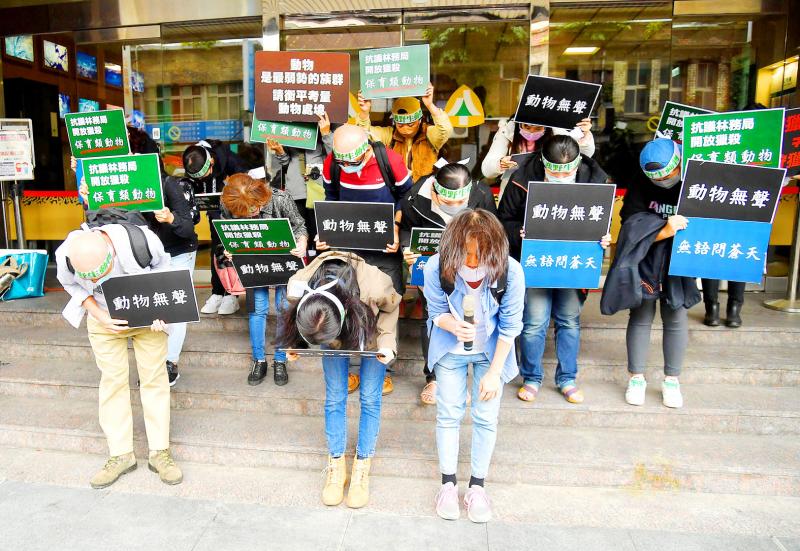Animal rights advocates yesterday staged a sit-in in front of the Forestry Bureau to protest a hearing on allowing special interest groups, including indigenous people, to hunt wildlife.
Protesters read out statements and shouted slogans such as “We oppose the bureau opening up for illegal hunting,” “Stop killing endangered wildlife” and “Animals cannot speak up for themselves, so we have to speak for them.”
Wildlife are living creatures and resources belonging to all citizens, not meat to be eaten by special interest groups, said Chu Tseng-hung (朱增宏), an executive at the Environment and Animal Society of Taiwan.

Photo: CNA
Also present were members from the Taiwan Animal Equality Association, the Taiwan Society for the Prevention of Cruelty to Animals, the mLife Conservationist Association, the Animal Protection Association of ROC and the Taiwan Dog Lovers’ Association, the groups’ news release said.
Chu said they are opposed to the bureau, as an agency under Council of Agriculture, opening a backdoor for certain sectors to enter protected forests and other preserved areas to illegally hunt wildlife.
“Hunting is not conservation. We are totally against permitting illegal hunting, which the bureau is proposing to do through a ‘self-management policy,’” Chu said.
The groups held the protest as a hearing about proposed wildlife hunting regulations for indigenous communities went on inside the bureau.
The animal rights advocates entered the venue after a brief sit-in, and some members charged the podium to voice their objections, temporarily interrupting the proceedings.
In their news release, the groups said there is a need to protect animals from cruelty, such as steel-jaw traps.
If conservation programs are not enforced, all of Taiwan’s protected wildlife species would become extinct, the groups said.
“Under current law, there is no legal way for anyone in the nation to hunt wildlife. The only exceptions are cases in which a person is attacked by an animal and must protect their own life, and instances of animals causing serious damage to agricultural production,” the groups said, citing examples of farmers repelling Formosan macaques.
The groups said these laws are enforced in all locations, even on private land, as they are meant to protect wildlife.
Meanwhile, the bureau and indigenous groups cited Constitutional Interpretation No. 803 issued by the Council of Grand Justices last year, which stressed respect for traditional practices and cultures.
The interpretation stated that protected wildlife species should not be among the animals indigenous groups hunt unless there are special circumstances, the indigenous groups said.
“The court permitted hunting of animals only for traditional rituals and for ‘own use,’ but this is not clearly defined,” they said.
Animal rights advocates said that these gray areas are prone to abuse, and urged government agencies to issue clear regulations on what hunting tools can be used, what “own use” means, and whether the meat can be consumed by family members and people within the community.
The advocates demanded that bureau officials assess the situation and collect data on how many animals people are permitted to hunt, as well as other details such as which species, and share it with the public.
“How will the indigenous communities enforce ‘self-management’ ... and what oversight mechanism will be set up to monitor the process?” they asked.

Taiwan is stepping up plans to create self-sufficient supply chains for combat drones and increase foreign orders from the US to counter China’s numerical superiority, a defense official said on Saturday. Commenting on condition of anonymity, the official said the nation’s armed forces are in agreement with US Admiral Samuel Paparo’s assessment that Taiwan’s military must be prepared to turn the nation’s waters into a “hellscape” for the Chinese People’s Liberation Army (PLA). Paparo, the commander of the US Indo-Pacific Command, reiterated the concept during a Congressional hearing in Washington on Wednesday. He first coined the term in a security conference last

Prosecutors today declined to say who was questioned regarding alleged forgery on petitions to recall Democratic Progressive Party (DPP) legislators, after Chinese-language media earlier reported that members of the Chinese Nationalist Party (KMT) Youth League were brought in for questioning. The Ministry of Justice Investigation Bureau confirmed that two people had been questioned, but did not disclose any further information about the ongoing investigation. KMT Youth League members Lee Hsiao-liang (李孝亮) and Liu Szu-yin (劉思吟) — who are leading the effort to recall DPP caucus chief executive Rosalia Wu (吳思瑤) and Legislator Wu Pei-yi (吳沛憶) — both posted on Facebook saying: “I

Sung Chien-liang (宋建樑), who led efforts to recall Democratic Progressive Party (DPP) Legislator Lee Kun-cheng (李坤城), was released on bail of NT$80,000 today amid outcry over his decision to wear a Nazi armband to questioning the night before. Sung arrived at the New Taipei District Prosecutors’ Office for questioning in a recall petition forgery case last night wearing a red armband bearing a swastika, carrying a copy of Adolf Hitler’s Mein Kampf and giving a Nazi salute. Sung left the building at 1:15am without the armband and covering the book with his coat. Lee said today that this is a serious

The Ministry of Economic Affairs has fined Taobao NT$1.2 million (US$36,912) for advertisements that exceed its approved business scope, requiring the Chinese e-commerce platform to make corrections in the first half of this year or its license may be revoked. Lawmakers have called for stricter enforcement of Chinese e-commerce platforms and measures to prevent China from laundering its goods through Taiwan in response to US President Donald Trump’s heavy tariffs on China. The Legislative Yuan’s Finance Committee met today to discuss policies to prevent China from dumping goods in Taiwan, inviting government agencies to report. Democratic Progressive Party Legislator Kuo Kuo-wen (郭國文) said